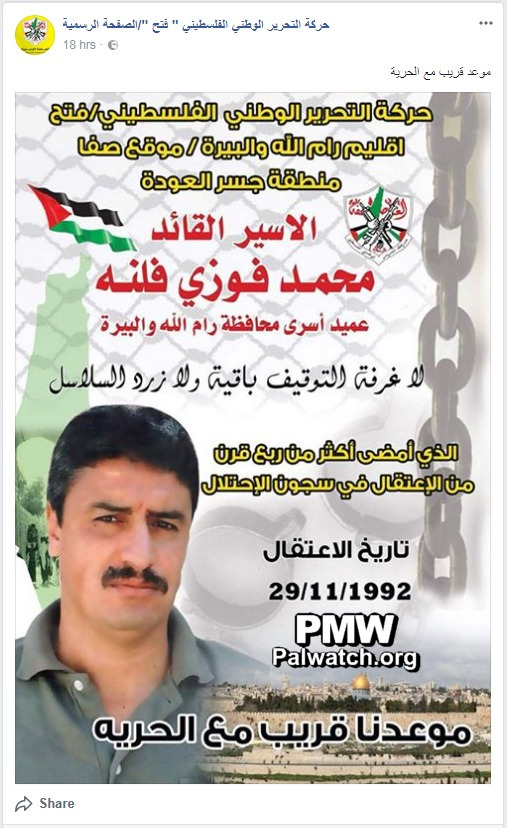Fatah Facebook post glorifies imprisoned terrorist who murdered an Israeli, with map of "Palestine" replacing Israel in the background

Image and text posted on the official Fatah Facebook page
Posted text: “Freedom is drawing near”
The bottom left of the image shows a picture of terrorist Muhammad Falana, who murdered 1 together with an accomplice. Above him appears the PA map of “Palestine” that presents all of Israel as “Palestine” together with the PA areas, with a picture of Arab women walking inside it, and above it is the Palestinian flag. To the right of the flag is the Fatah logo that includes a grenade, crossed rifles, and the PA map of “Palestine.” A keffiyeh (Arab headdress) pattern is seen at the top of the image, and to the right is a chain with a pair of cuffs next to it. At the bottom of the image appears the Temple Mount.
Text on image:
“Fatah Movement
Ramallah and El-Bireh branch…
Sub-branch Jisr Al-Awda
Prisoner commander
Muhammad Fawzi Falana
The most veteran prisoner of the Ramallah and El-Bireh district
‘The prison cell will not remain forever, and neither will the chains’ (This is a quote from a poem by Palestinian national poet Mahmoud Darwish –Ed.)
[Falana,] who has served over a quarter century in the occupation’s prisons
Date of arrest
Nov. 29, 1992
Freedom is drawing near”
Click to view bulletin
Muhammad Falana – serving a life sentence for planting a bomb with an accomplice near the town of Dolev in the West Bank in 1992. 1 person was murdered and 6 were injured in the bombing.
Mahmoud Darwish is considered the Palestinian national poet. He published over 30 volumes of poetry and 8 books of prose and has won numerous awards. He joined the Israeli Communist Party in 1961 and the terrorist organization PLO in 1973, becoming a member of the PLO Executive Committee in 1987. He left the PLO in 1993 because it signed the Oslo Accords with Israel.
Many in Israel see his poetry as inciting hate and violence. One poem he wrote in 1988 at the height of the Palestinian wave of violence and terror against Israel (the first Intifada, 1987-1993) calls to Israelis: “Take your portion of our blood - and be gone… Live wherever you like, but do not live among us… Die wherever you like, but do not die among us… Leave our country, our land, our sea, our wheat, our salt, our wounds, everything, and leave the memories of memory.”
He also wrote “Silence for the Sake of Gaza” in 1973, which many see as glorifying terror: “She wraps explosives around her waist and blows herself up. It is not a death, and not a suicide. It is Gaza's way of declaring she is worthy of life.”
His defenders have claimed that Israel misinterprets his poetry and that he sought reconciliation with Israel. One wrote in 2017: “Darwish arranged meetings between Palestinian and Israeli intellectuals, and published essays on their discussions. He was optimistic that, through mutual understanding, the two sides could eventually reconcile.” [https://www.bcalnoor.org/]
» View analysis citing this item